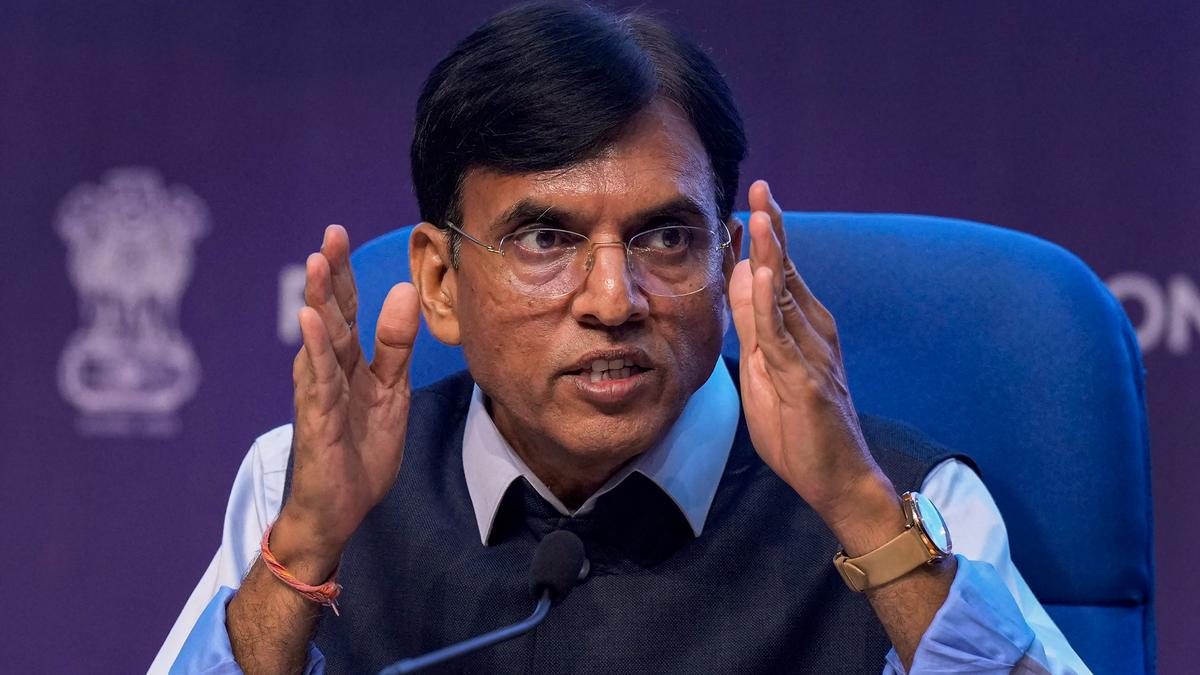Biofertilizer scheme gets Cabinet nod; sugarcane FRP hiked

Union Minister for Health & Family Welfare and Chemicals & Fertilizers Mansukh Mandaviya addresses a press conference on Cabinet Decisions, in New Delhi on June 28, 2023.
| Photo Credit: PTI
The Cabinet Committee on Economic Affairs (CCEA) on Wednesday approved the PM-PRANAM (PM Programme for Restoration, Awareness, Generation, Nourishment and Amelioration of Mother Earth) scheme, which was a promise made in the last Budget. Union Fertilizer Minister Mansukh Mandaviya told reporters after the meeting that the new scheme would promote use of nutrient-based, biofertilizers for sustainable agriculture and it would have a total outlay of ₹3,70,128.7 crore.
The CCEA also hiked the Fair and Remunerative Price (FRP) of sugarcane by ₹10 per quintal. The FRP for the sugar season 2023-24 (October-September) will be ₹315 per quintal for a basic recovery rate of 10.25%. Last year, the amount was ₹305.
The PM-PRANAM scheme was aimed at saving the soil and promote sustainable, balanced use of fertilizers and it involved the participation of State governments, Mr. Mandaviya said. He said the Centre would incentivise those States which would adopt alternative fertilizers with the subsidy that was saved by reducing the use of chemical fertilizers. Mr. Mandaviya said if a State was using 10 lakh tonnes of conventional fertilizers and reduces its consumption by three lakh tonnes, then the subsidy saving would be ₹3,000 crore. “Out of that subsidy savings, the Centre will give 50% of it — ₹1,500 crore to the State for promoting the use of alternative fertilizer and other development works,” the Minister added.
Also read: Cabinet nod to set up National Research Foundation to boost R and D
Urea subsidy scheme
The Centre said in a release that the scheme included a bouquet of various schemes which would boost farmers’ income, strengthen natural / organic farming, rejuvenate soil productivity, and ensure food security. The CCEA also approved continuation of the urea subsidy scheme to ensure constant availability of urea to the farmers at the same price of ₹242/ 45 kg per bag. “Out of the above approved package, ₹3,68,676.7 crore has been committed for urea subsidy for three years. This is apart from recently approved nutrient-based subsidy of ₹38,000 crore for the Kharif season for 2023-24. The farmers need not spend extra for purchase of urea, and this will help moderate their input costs,” the release said.
Mr. Mandaviya said the use of nano urea had also increased in the country. “By 2025-26, eight nano urea plants with production capacity of 44 crore bottles, equalling to 195 lakh tonnes of conventional urea, will be commissioned,” he said.
Apart from that, ₹1,451.84 crore has been approved for Market Development Assistance (MDA) for promoting organic fertilizers from Gobardhan plants. Fermented Organic Manures (FOM)/Liquid FOM/Phosphate Rich Organic Manures (PROM) produced as by-product from bio-gas plants/Compressed Biogas (CBG) plants set up under umbrella Gobardhan initiative will be promoted. “Such organic fertilizers would be branded in the names of Bharat Brand FOM, LFOM and PROM. This on one hand will facilitate in addressing the challenge of management of crop residue and problems of stubble burning, and will also help in keeping the environment clean and safe and at the same time provide an additional source of income for farmers. Farmers will get organic fertilizers (FOM/LFOM/ PROM) at affordable prices,” the Centre said.
Also read: Govt. hikes sugarcane FRP by ₹10/quintal to ₹315/quintal for 2023-24 season
Cane farmers to benefit
Regarding the sugarcane FRP hike, the Centre said the decision was taken in the interest of sugarcane farmers. The CCEA also decided to provide a premium of ₹ 3.07 per quintal for each 0.1% increase in recovery over and above 10.25%, and reduction in FRP by ₹ 3.07 per quintal for every 0.1% decrease in recovery (sugar produced from the sugarcane).
“Further, with a view to protect interest of sugarcane farmers, government has also decided that there shall not be any deduction in case of sugar mills where recovery is below 9.5%. Such farmers will get ₹ 291.975 per quintal for sugarcane in ensuing sugar season 2023-24 in place of ₹ 282.125 per quintal in current sugar season 2022-23,” a Government release said. Announcing the decision after the CCEA meeting, Cabinet Minister for Information and Broadcasting Anurag Thakur said the move will also help to reduce the arrears to be given to farmers and sugar mills have adequate money to pay farmers.
The Centre has calculated the cost of production of sugarcane as ₹ 157 per quintal based on the inputs from States and the Commission on Agricultural Costs and Prices (CACP). “This FRP of ₹ 315 per quintal at a recovery rate of 10.25% is higher by 100.6% over production cost. The FRP for sugar season 2023-24 is 3.28% higher than current sugar season 2022-23,” the Centre said.
In 2022-23, about 3,353 lakh tons of sugarcane of worth ₹1,11,366 crore purchased by sugar mills. A part of this is used for ethanol production too. “The Ethanol Blended with Petrol (EBP) Programme has saved foreign exchange as well as strengthen energy security of the country and has reduced dependence on imported fossil fuel thereby helping in achieving the goal of Atmanirbhar Bharat in petroleum sector,” the Centre said.
For all the latest business News Click Here

